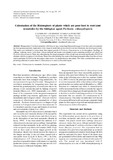| dc.contributor.author | Luambano, N | |
| dc.contributor.author | Kimenju, J. W | |
| dc.contributor.author | Narla, R | |
| dc.contributor.author | Waceke, J. W | |
| dc.date.accessioned | 2013-06-18T09:59:02Z | |
| dc.date.available | 2013-06-18T09:59:02Z | |
| dc.date.issued | 2011 | |
| dc.identifier.citation | N. Luambano, J. W. Kimenju, R. Narla & J. W. Waceke (2011). Colonisation of the Rhizosphere of plants which are poor host to root-knot nematodes by the biological agent Pochonia chlamydosporia. African Crop Science Conference Proceedings, Vol. 10. pp. 195 - 197 | en |
| dc.identifier.uri | http://www.acss.ws/Upload/XML/Research/772.pdf | |
| dc.identifier.uri | http://hdl.handle.net/11295/35526 | |
| dc.description.abstract | Management of root-knot nematodes (Meloidogyne spp.,) using fungi that parasitize eggs of root-knot and cyst nematodes
has been gaining popularity. Application of this fungus to plants that are poor host to root-knot nematodes has shown good results.
This study was conducted to screen plants that support growth of Pochonia chlamydosporia on its rhizosphere. Seedlings of
cabbage, sunhemp, maize, velvet bean, African marigold and tomato were planted in pots containing sterilized soil which had
Pochonia chlamydosporia. Thirty days after planting, the fungal propagules in the soil and roots increased significantly (P<0.05) in
all plants with the exception of velvet beans. Ninety days after planting, the counts of the fungal propagules taken from the soil were
significant higher (P<0.05) in the rhizosphere where maize was planted than in other plants. This study concluded that maize is a
promising rotational in system where P. chlamydosporia is used as a biocontrol agent. | en |
| dc.language.iso | en | en |
| dc.title | Colonisation of the Rhizosphere of plants which are poor host to root-knot nematodes by the biological agent Pochonia chlamydosporia | en |
| dc.type | Presentation | en |

